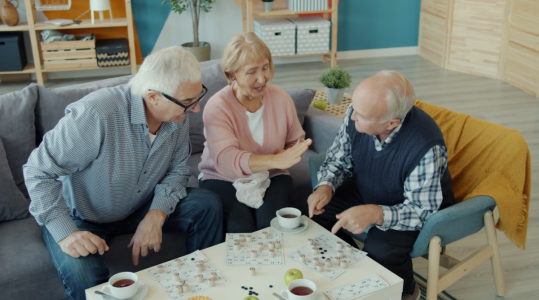Feeling lonely? Here’s how senior living can improve your health and social life
- Replies 0
Sometimes, finding happiness later in life isn’t about slowing down—it’s about finding the right place to thrive.
Many older adults discover that connection, laughter, and a supportive community can make all the difference in how they feel day to day.
Beyond the comfort of routine, there’s a deeper reward in rediscovering purpose and joy alongside others who share the same stage of life.
For some, that shift begins the moment they move into a senior living community that values independence as much as companionship.
For residents like 71-year-old Sally Quale and 92-year-old Edward Thomas, life at Mease Life in Dunedin, Florida, is proof that age doesn’t have to mean isolation.
Both say that staying active, social, and positive has changed their outlook—and their health. “Places have changed over the years,” Thomas says, reflecting on how modern senior living communities have evolved from outdated stereotypes.
Mease Life is “a place that offers everything I could ever ask for at this wonderful stage of my life,” he adds.
Thomas, a retired minister with a doctorate in ministry, spends his days in ways that feed both his body and spirit.

He exercises regularly at the wellness center, takes long walks to greet neighbors and staff, and enjoys dinners with friends—especially on lobster nights, when the staff goes the extra mile to help residents enjoy their meals.
He also stays active in a nearby church, writing devotionals and staying connected with his faith community. For Thomas, those daily interactions are the cornerstone of fulfillment in this new chapter of life.
For Quale, the move to Mease Life was about reclaiming balance and joy after years of managing the demands of homeownership.
“I loved my house, but it was getting to be too much,” she says. “I’d wake up and think, ‘I have to clean the pool tomorrow,’ or I’d worry about maintenance, insurance and taxes. Now, I wake up and think, ‘What kind of fun things will I be doing today?’” she adds.
Also read: Some places might surprise you as the best for seniors living alone
Conversations with friends now center around activities and laughter—not health complaints—and she says she feels lighter and happier than she has in years.
In just four months, Quale has already noticed measurable changes. She’s sleeping better, her blood pressure has gone down, and she says she feels less stressed overall.
“I feel such a sense of relief,” she says. “I feel happier and less stressed than I’ve been in years.” Experts agree that this kind of social engagement can do more than lift spirits—it can literally help people live longer.
Research shows strong social connections can lower blood pressure and reduce the risk of heart disease, stroke, and even depression.
Also read: Assisted living qualifications: What to expect and who it’s designed for
Amanda Krisher, associate director of behavioral health at the National Council on Aging, says even small acts of connection can make a meaningful difference. “People who are socially connected report being happier and more resilient,” she explains.
“We also see a reduced risk for depression, anxiety, stress, post-traumatic stress disorder and cognitive decline.” She suggests that communities encourage interaction through potlucks, volunteer programs, or buddy systems to help residents bond and newcomers feel welcome.
The goal, she says, is to create opportunities that make connection easy and natural. For Thomas, who calls his current chapter “settled in for the unsettled nineties,” the comfort of community brings peace of mind.
He says that being surrounded by friends and support allows him to embrace aging with optimism rather than fear. Quale agrees, describing her decision to move as one of the best choices she’s ever made. “This is what I wanted my retirement to look like,” she says, her smile reflecting the confidence of someone who’s found exactly where she belongs.
Read next:

Have you or someone you love considered senior living as a way to stay active and connected? It might just offer more than comfort—it could mean a healthier, happier lifestyle. The stories of residents like Sally and Edward show that aging well is about choosing engagement over isolation. Would you ever see yourself embracing this kind of community living in your later years?
Many older adults discover that connection, laughter, and a supportive community can make all the difference in how they feel day to day.
Beyond the comfort of routine, there’s a deeper reward in rediscovering purpose and joy alongside others who share the same stage of life.
For some, that shift begins the moment they move into a senior living community that values independence as much as companionship.
For residents like 71-year-old Sally Quale and 92-year-old Edward Thomas, life at Mease Life in Dunedin, Florida, is proof that age doesn’t have to mean isolation.
Both say that staying active, social, and positive has changed their outlook—and their health. “Places have changed over the years,” Thomas says, reflecting on how modern senior living communities have evolved from outdated stereotypes.
Mease Life is “a place that offers everything I could ever ask for at this wonderful stage of my life,” he adds.
Thomas, a retired minister with a doctorate in ministry, spends his days in ways that feed both his body and spirit.

Feeling lonely? Here’s how senior living can improve your health and social life. Image source: Vitaly Gariev / Unsplash
He exercises regularly at the wellness center, takes long walks to greet neighbors and staff, and enjoys dinners with friends—especially on lobster nights, when the staff goes the extra mile to help residents enjoy their meals.
He also stays active in a nearby church, writing devotionals and staying connected with his faith community. For Thomas, those daily interactions are the cornerstone of fulfillment in this new chapter of life.
For Quale, the move to Mease Life was about reclaiming balance and joy after years of managing the demands of homeownership.
“I loved my house, but it was getting to be too much,” she says. “I’d wake up and think, ‘I have to clean the pool tomorrow,’ or I’d worry about maintenance, insurance and taxes. Now, I wake up and think, ‘What kind of fun things will I be doing today?’” she adds.
Also read: Some places might surprise you as the best for seniors living alone
Conversations with friends now center around activities and laughter—not health complaints—and she says she feels lighter and happier than she has in years.
In just four months, Quale has already noticed measurable changes. She’s sleeping better, her blood pressure has gone down, and she says she feels less stressed overall.
“I feel such a sense of relief,” she says. “I feel happier and less stressed than I’ve been in years.” Experts agree that this kind of social engagement can do more than lift spirits—it can literally help people live longer.
Research shows strong social connections can lower blood pressure and reduce the risk of heart disease, stroke, and even depression.
Also read: Assisted living qualifications: What to expect and who it’s designed for
Amanda Krisher, associate director of behavioral health at the National Council on Aging, says even small acts of connection can make a meaningful difference. “People who are socially connected report being happier and more resilient,” she explains.
“We also see a reduced risk for depression, anxiety, stress, post-traumatic stress disorder and cognitive decline.” She suggests that communities encourage interaction through potlucks, volunteer programs, or buddy systems to help residents bond and newcomers feel welcome.
The goal, she says, is to create opportunities that make connection easy and natural. For Thomas, who calls his current chapter “settled in for the unsettled nineties,” the comfort of community brings peace of mind.
He says that being surrounded by friends and support allows him to embrace aging with optimism rather than fear. Quale agrees, describing her decision to move as one of the best choices she’s ever made. “This is what I wanted my retirement to look like,” she says, her smile reflecting the confidence of someone who’s found exactly where she belongs.
Read next:
- How to choose the right assisted living facility: your step-by-step checklist
- Elder care in danger: Nursing homes shutter as demand soars
Key Takeaways
- Seniors Sally Quale and Edward Thomas show how life in a senior living community can bring renewed purpose, friendship, and well-being.
- Both residents of Mease Life in Dunedin, Florida, say that socializing, staying active, and maintaining a positive mindset have transformed their daily lives.
- Experts note that strong social connections can lower health risks and improve mental resilience, especially among older adults.
- Their experiences illustrate how today’s senior living communities foster not just care, but connection, independence, and joy.






